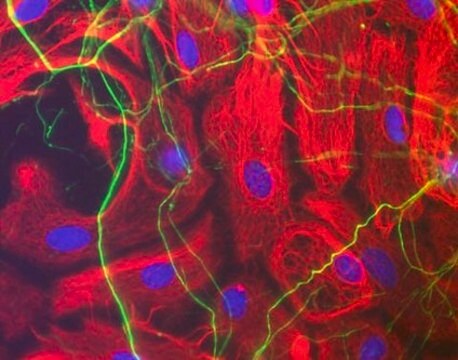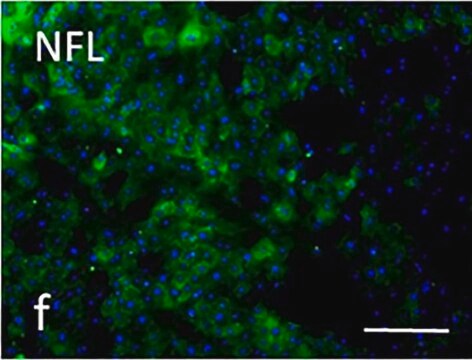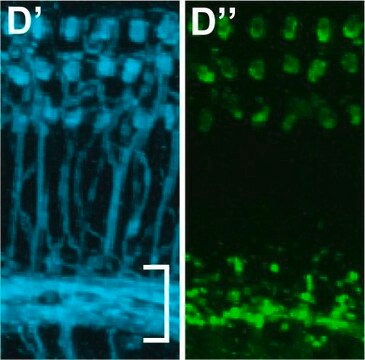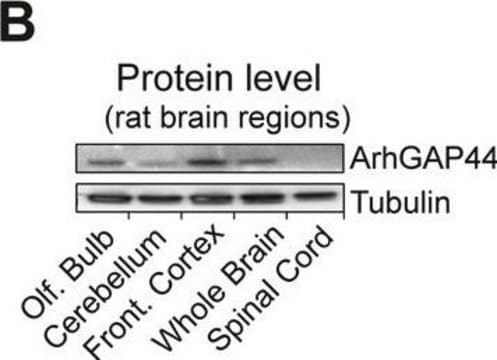おすすめの製品
由来生物
mouse
品質水準
抗体製品の状態
purified antibody
抗体製品タイプ
primary antibodies
クローン
SMI-31, monoclonal
形状
liquid
含みます
≤0.1% sodium azide as preservative
化学種の反応性
chicken, Xenopus
化学種の反応性(ホモロジーによる予測)
mammals
メーカー/製品名
Calbiochem®
保管条件
OK to freeze
avoid repeated freeze/thaw cycles
アイソタイプ
IgG1
輸送温度
wet ice
保管温度
2-8°C
ターゲットの翻訳後修飾
unmodified
遺伝子情報
human ... NEFH(4744)
詳細
Mouse monoclonal antibody supplied as purified antibody. Recognizes the ~180-200 kDa phosphorylated neurofilament H protein.
Recognizes the ~180-200 kDa phosphorylated neurofilament H protein in rat central nervous system (CNS) cytoskeletal preparations. Also weakly recognizes phosphorylated NF-M protein.
This PhosphoDetect Anti-Neurofilament H Mouse mAb (SMI-31) is validated for use in ELISA, Frozen Sections, Immunoblotting, ICC, Paraffin Sections, IP for the detection of Neurofilament H.
免疫原
homogenized, hypothalami from Fischer 344 rat brain
アプリケーション
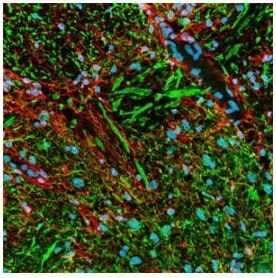
ELISA (1:1000)
Frozen Sections (1:1000, see comments)
Immunoblotting (1:1000)
Immunocytochemistry (1:1000, see comments)
Paraffin Sections (1:1000, heat pre-treatment required, see comments)
Immunoprecipitation (see comments)
警告
Toxicity: Standard Handling (A)
物理的形状
In PBS and Thimerosal
その他情報
Raina, A.K., et al. 1999. Neuroreport10, 1355.
Yang, C.C., et al. 1998. Brain121, 1089.
Giasson, B.I and Mushynski, W.E. 1996. J. Biol. Chem.271, 30404.
Mirabella, M., et al. 1996. J. Neuropath. Exp. Neurol.55, 774.
Xiao, J. and Monteiro, M.J. 1994. J. Neurosci.14, 1820.
Yang, C.C., et al. 1998. Brain121, 1089.
Giasson, B.I and Mushynski, W.E. 1996. J. Biol. Chem.271, 30404.
Mirabella, M., et al. 1996. J. Neuropath. Exp. Neurol.55, 774.
Xiao, J. and Monteiro, M.J. 1994. J. Neurosci.14, 1820.
Strongly recognizes phosphorylated neurofilament H and, to a lesser extent, phosphorylated neurofilament M. By immunocytochemistry this antibody broadly stains thick and thin axons and some dendrites, such as basket cell dendrites, but not Purkinje cell dendrites. Does not generally stain nerve cell bodies or other cells and tissues except peripheral axons. May also stain neuronal cell bodies in pathological conditions. Aberrant phosphorylation of neurofilament H in cell bodies can be demonstrated in neuronal cell cultures following treatment with agents that induce stress-activated protein kinase. This antibody is reported to co-immunoprecipitate neurofilament-associated kinase (NAK 115) via interaction of the antibody with the tail domain of neurofilament H. Phosphatase treatment of tissue sections or immunoblotting samples abolishes antibody reactivity. Reactivity is unaffected by trypsin treatment of samples. Tissues and cultured cells can be fixed with a variety of paraformaldehyde- or formaldehyde-containing fixatives, including Bouin′s fixative. Post-fixation in cold methanol or methanol/hydrogen peroxide facilitates access of the antibody to the epitope in frozen sections or thick tissue sections fixed in 4% paraformaldehyde and in cultured cells. For staining formalin-fixed, paraffin sections it is recommended that the de-paraffinized tissue be autoclaved in dH2O for 10 min or boiled in Tris-buffered saline, pH 9.0, in a microwave for 15 min to expose the epitope. Antibody should be titrated for optimal results in individual systems.
法的情報
CALBIOCHEM is a registered trademark of Merck KGaA, Darmstadt, Germany
適切な製品が見つかりませんか。
製品選択ツール.をお試しください
保管分類コード
12 - Non Combustible Liquids
WGK
nwg
引火点(°F)
Not applicable
引火点(℃)
Not applicable
適用法令
試験研究用途を考慮した関連法令を主に挙げております。化学物質以外については、一部の情報のみ提供しています。 製品を安全かつ合法的に使用することは、使用者の義務です。最新情報により修正される場合があります。WEBの反映には時間を要することがあるため、適宜SDSをご参照ください。
Jan Code
NE1022-UL:
NE1022-100UL:
試験成績書(COA)
製品のロット番号・バッチ番号を入力して、試験成績書(COA) を検索できます。ロット番号・バッチ番号は、製品ラベルに「Lot」または「Batch」に続いて記載されています。
Takuya Hayashi et al.
Molecular neurodegeneration, 8, 4-4 (2013-01-22)
Neurodegenerative diseases including Parkinson's and Alzheimer's diseases progress slowly and steadily over years or decades. They show significant between-subject variation in progress and clinical symptoms, which makes it difficult to predict the course of long-term disease progression with or without
Seungyong Lee et al.
Nature communications, 12(1), 4939-4939 (2021-08-18)
Pain is a central feature of soft tissue trauma, which under certain contexts, results in aberrant osteochondral differentiation of tissue-specific stem cells. Here, the role of sensory nerve fibers in this abnormal cell fate decision is investigated using a severe
Michael J Whitehead et al.
Scientific reports, 8(1), 5219-5219 (2018-03-28)
Axon degeneration underlies many nervous system diseases; therefore understanding the regulatory signalling pathways is fundamental to identifying potential therapeutics. Previously, we demonstrated heparan sulphates (HS) as a potentially new target for promoting CNS repair. HS modulate cell signalling by both
Justin C Burrell et al.
Neurosurgery, 87(4), 833-846 (2020-05-12)
Millions of Americans experience residual deficits from traumatic peripheral nerve injury (PNI). Despite advancements in surgical technique, repair typically results in poor functional outcomes due to prolonged periods of denervation resulting from long regenerative distances coupled with slow rates of
Justin C Burrell et al.
Journal of biomedical materials research. Part A, 109(7), 1183-1195 (2020-09-29)
Promising biomaterials should be tested in appropriate large animal models that recapitulate human inflammatory and regenerative responses. Previous studies have shown tyrosine-derived polycarbonates (TyrPC) are versatile biomaterials with a wide range of applications across multiple disciplines. The library of TyrPC
ライフサイエンス、有機合成、材料科学、クロマトグラフィー、分析など、あらゆる分野の研究に経験のあるメンバーがおります。.
製品に関するお問い合わせはこちら(テクニカルサービス)
